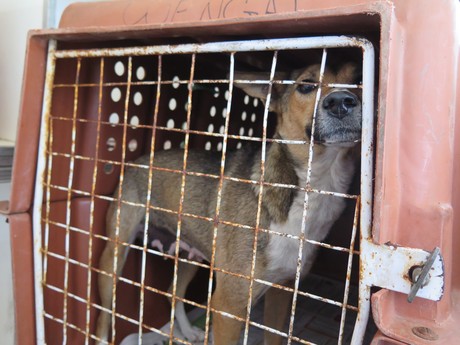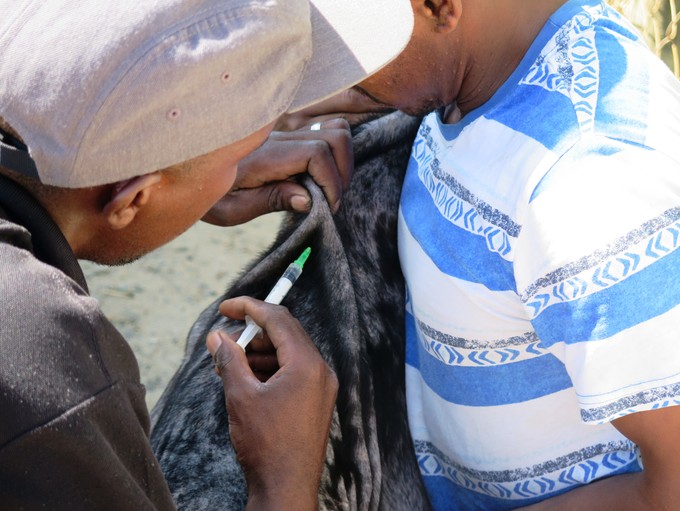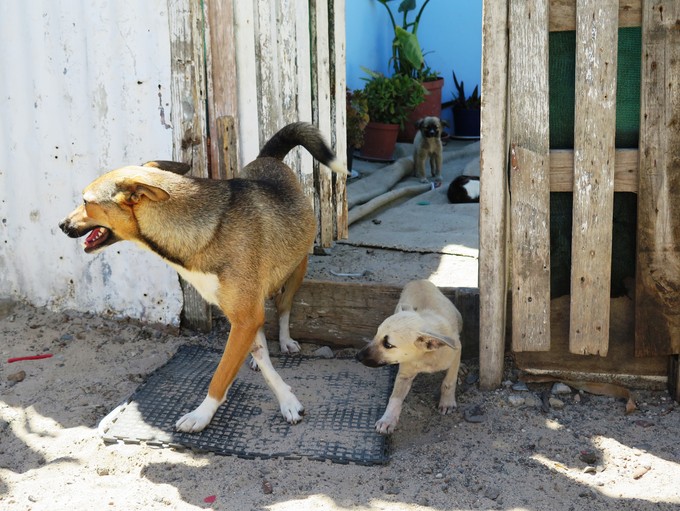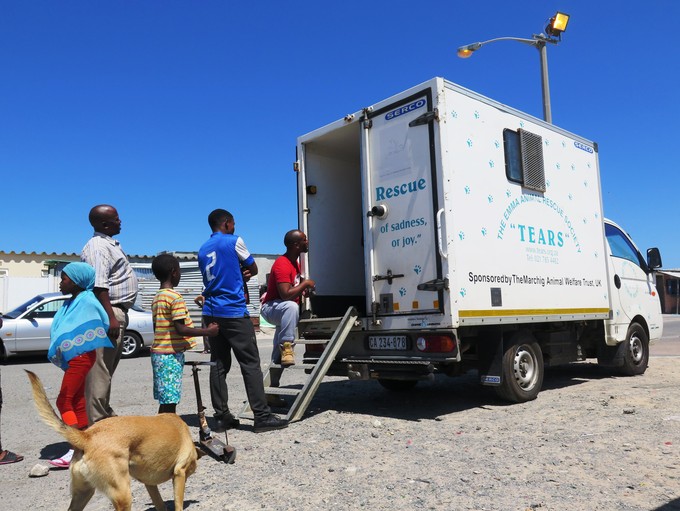Sick pets get a free lift in Vrygrond
Mobile clinic makes a huge difference for pet owners in working class neighbourhoods
Sheeba peeks out of a small cage in the TEARS mobile animal clinic, a van that travels to Masiphumelele, Ocean View and Vrygrond a number of times a week, providing vital primary care to the four legged creatures that live in these communities.
Sheeba, a tan and white mongrel, has just been sterilised and is being taken back to Vrygrond to be reunited with her two puppies.
Eric Ndzube is one of two men who take turns to drive the van, collecting dogs and cats for sterilisation, administering injections and educating pet owners about animal care.
Ndzube, joined TEARS (The Emma Animal Rescue Society) in 2013. He administers vaccinations and other injections for diseases such as mange, conducts basic health assessments on the animals, and drives the van. He says he has only been bitten by a dog once, when he first began working at TEARS, saying with a laugh that this was his “welcoming”.
The van is essential for Vrygrond as most of the pet owners do not have the means to take their pets to TEARS in Sunnydale, 30 minutes’ drive away.
When the van leaves TEARS on a sweltering hot Friday afternoon bound for Vrygrond, it is spotless; the cages are cleaned, the medication is packed and Sheeba has been loaded into the back.

At the clinic’s first stop, the Vrygrond taxi rank, a man brings Danger, a flea ridden but friendly pit bull. He says his dog is not eating properly. Ndzube conducts a standard inspection – feeling the dog’s body, checking his mouth, and asking its owner various questions. The dog needs to be dewormed, but the owner must return on Monday when he has the medication with him. The owner also buys a R15 flea dip, a popular item from the clinic.
Ndzube says that most of the items available from the mobile clinic are discounted such as the flea dip and the vaccinations, but sterilisation is completely free. Despite this, when Sheeba is dropped off, her owner donates R50 to TEARS. Ndzube says that the residents in the communities he services appreciate TEARS’s work; they can see the difference that TEAR’s presence has had on their animals. People continually stop the van as it drives around, asking for help to care for their animals.
At the clinic’s second stop, Kim, a mange covered pit bull, is administered an injection for his mange. Ndzube says that before Kim started the treatment, she was covered in sores and that her current near hairless state is actually a great improvement.

Ndzube then has to ask a family for permission for TEARS to put their dog to sleep as its leg was shattered when it was run over by a car earlier in the week. The owners hold each other tearfully as Ndzube explains the situation.
He says that this is one of the most stressful parts of his job, and that it is also very difficult to ask someone to surrender their animal to TEARS if the owner is unable to afford the vet bill or unable to adequately look after their pet.
Ndzube leaves Vrygrond with a small injured dog in the back – another hit and run; this time, the dog has a bone protruding from its hip, which Ndzube says will probably result in a leg amputation.
“It is stressful,” he says of the work on the mobile clinic, “I have to do all the check-ups and [give] medication. I need to have a lot of attention and focus.”
Consulting alone with patients also requires constant concentration as he needs to assess whether the animal needs to be brought into TEARS to see the vet or whether he can administer the medication himself.
Despite this, Ndzube manages to calm anxious pet owners and never seems flustered. The animals’ wellbeing always appears to be in the forefront of his mind.
“When an animal is sick they can’t talk, but you can see they are suffering,” says Ndzube. “It is a sad thing when you hear the noise of a dog or cat crying”.

Support independent journalism
Donate using Payfast

Don't miss out on the latest news
We respect your privacy, and promise we won't spam you.
© 2016 GroundUp. 
This article is licensed under a Creative Commons Attribution-NoDerivatives 4.0 International License.

